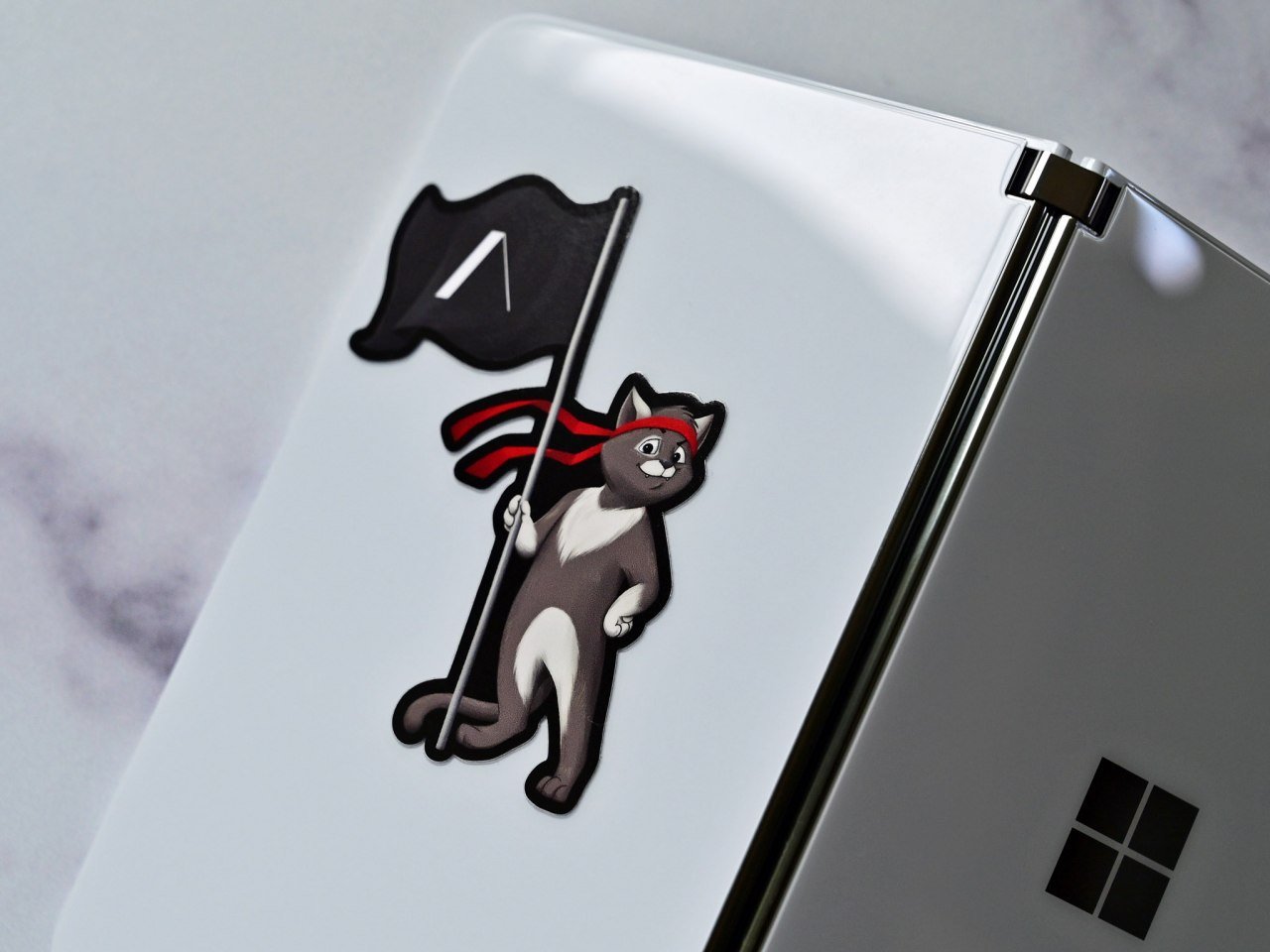5 reasons why Microsoft canceling 'Project Andromeda' was the right choice
 Source: Daniel Rubino / Windows Key
Source: Daniel Rubino / Windows Key
Despite some ingenious concepts and ideas, Microsoft'southward mobile ambitions have always been controversial, uphill battles. In our latest study, we detailed one such attempt under the proper noun 'Project Andromeda.' The idea was killed over quondam in late 2022, but parts of it live on in the current Android-driven Surface Duo line of devices, and even in Windows 11.
Putting my personal feelings aside (I'd always prefer to utilize a native Microsoft Os instead of Android or iOS), canceling the project was the correct decision.
Here are five reasons why.
1. Behind schedule, and failed to deliver
File this under poor project management, but from what nosotros have reported in the past, Andromeda was canned because it was fashion backside schedule and not hit project milestones.
If you ever worked for a major visitor and oversaw a project that was not delivering the results y'all were tasked with producing, well, that's a dilemma. Companies have to think about and plan budgets, timeframes, coordination with hardware manufacturing, and even marketing. If everyone is waiting for the Bone to be done and you can't deliver it, at some bespeak, senior leadership needs to footstep in and make some tough decisions.
Yes, information technology's a lame reason, but ultimately, Andromeda failed to deliver the results. This result seems to be an ongoing problem with Microsoft, whether information technology's Cadre Bone, Andromeda, Windows x Mobile, Windows File Organisation (WinFS), Windows 10X, or even "micro" OSes similar on Microsoft Ring.
Microsoft has an endemic problem creating and maintaining operating systems that are non proper x86 Windows. And that'southward technically another hidden reason: Would Microsoft accept maintained and stuck with Andromeda Os?
Permit'south also not forget that the entire UI would exist supplanted by 'Sun Valley' and Windows 11 simply a few short years later. That means Microsoft would accept had to redesign it all at some indicate.
Tl;dr: The OS didn't work.
2. Not the right fourth dimension: Windows ten Mobile was dead
 Source: Daniel Rubino / Windows Central
Source: Daniel Rubino / Windows Central
In late 2022, we were already reporting on the sorry state of crowd-funded Windows phones for 2022. The timing for Andromeda was just off. Had the project started in 2022, maybe things could accept been different, only in 2022 this was, without question, the nadir of Microsoft's mobile OS ambitions.
The heyday of Windows Phone was years in the by at this point.
Indeed, the best-selling Windows Telephone was in 2022 with the $99 Lumia 520. Windows Phone never did well in the premium markets despite some headline-worthy (and fan-favorite) devices like the Lumia 1020, Lumia 1520, and Lumia 920.
When you combine those two points with the thought of a $1,400 Windows Telephone, well, there'southward not a lot of evidence to suggest it would have sold well, even with the Surface branding.
3. The app gap was more real than ever
 Source: Daniel Rubino / Windows Fundamental
Source: Daniel Rubino / Windows Fundamental
In 2022, developers more often than not abandoned making apps for Windows ten Mobile. Windows phone always had an app-gap trouble, which is a whole other topic, but releasing a device in 2022 with just UWP apps from the Microsoft Store would have been fifty-fifty more problematic, especially if the device costs well over $ane,000.
Sure, if somehow Project Andromeda was going to be a pocketable x86 Windows device, that'd be slightly better. But it was strictly ARM32/64. Interestingly, a pocketable real Windows PC was the original vision behind what is Surface Duo today, but the silicon just wasn't ready (and probably still isn't).
We can all lament Microsoft's current struggles with Surface Duo, but at that place'south 1 matter you absolutely can't criticize it for, which is apps, and that'southward just a fact.
4. A digital mobile journal device is super niche
 Andromeda OS was very focused on inking. Source: Windows Primal
Andromeda OS was very focused on inking. Source: Windows Primal
People criticize Surface Duo for being too specific to be successful. They say that at that place'southward non plenty market for it to sell well. I have dedicated niches in technology earlier, noting how they are the catalyst for new loftier-tech paradigms.
But at that place are limitations.
Project Andromeda and the resulting dual-screen device would have very few apps, cost $1,400, and been primarily focused on notetaking and journaling. This emphasis on the pen is a hallmark of Surface, but as well hearkens back to the "Microsoft Courier" concept.
It'southward a fascinating idea, for sure, just accept you noticed how there are very few Android phones that support inking? If I asked you to name ane, 99% of you would yell out Samsung's Galaxy Note series. And that'due south it. And even there, that'southward just a regular Milky way phone with an S Pen and a few clever apps.
The pen features on Surface Duo and Surface Duo 2 are slowly coming together, merely I'one thousand not convinced a pen-offset modality for a pocketable device would take been successful. Even Apple hasn't gone down this route yet.
To exist articulate, I'm not entirely against the idea, merely when you stack up all the other reasons against Andromeda, information technology's a tough sell.
5. Andromeda'southward end game was not clear
 The 2022 HP Elite x3 was awesome (and failed miserably). Source: Daniel Rubino / Windows Cardinal
The 2022 HP Elite x3 was awesome (and failed miserably). Source: Daniel Rubino / Windows Cardinal
File this nether "we simply don't know," but what was the long-term point of Andromeda OS? Hear me out.
When Microsoft built Windows Mobile/Phone/10 Mobile, the idea was to have an OS that could be licensed to OEMs to make Windows phones. The smartphone market was established, and it had landed on the generic "blackness slab" blueprint with a few attempts at minor hardware divergence.
Of form, it all failed, only the OS model was straightforward.
But with Andromeda, did Microsoft plan to build information technology only for its dual-screen device? If non, did information technology really await companies like HP, Samsung, or LG to leap on board and develop their own hardware with it? If information technology'southward the latter, why would they? Microsoft's previous aspirations in mobile were in absolute tatters, and all those companies lost money in those endeavors.
If, on the other manus, Microsoft only wanted Andromeda for itself, the justification for building it, the hardware, and trying to get developers on board seems absurdly challenging. Conversely, had Windows 10 Mobile been successful, everything would take been different, every bit Andromeda could exist an extension of that ecosystem. But that was not the case.
On its own, Andromeda was a big dream surrounded by many past failures, bad mojo, and a lack of faith from consumers.
Wrap up: Fans want it; the market does not
While I wish the unabridged history of Microsoft's strategy in mobile were dissimilar, the facts are what they are. 2022 was merely likewise tardily for something like Andromeda. Few apps, a disappearing developer base, a radical new UX with a focus on inking, very costly hardware, and coming off years of losses in smartphones and mobile, the entire surroundings for Andromeda was only not correct.
Let's likewise not forget that the whole projection was behind schedule, missing milestones, and quite buggy. If Microsoft never figured out Windows 10 Mobile, what makes you think Andromeda would accept been any better?
And while Surface Duo 2 is still struggling for acceptance, it has a much improve take a chance with Android in the long run. And, at the very to the lowest degree, Microsoft tried something to save the aggressive hardware pattern of Surface Duo. I'yard actually happy about that equally someone who loves the device.
Will Microsoft ever return to such a concept equally Andromeda? I doubt it. But I exercise think the Surface team yearns for a foldable Surface Pro-similar device, someday, that runs full Windows, just that's yet a few years out.

Oh Dear
New study reveals Microsoft'due south future AR strategy; HoloLens three is expressionless
Business Insider has today published a follow-upward report with more than details nearly Microsoft's canceled HoloLens 3 augmented reality headset. The partnership with Samsung is said to include a headset with a set of screens within, powered past a Samsung phone in your pocket.

Keeping it affordable
Review: Surface Laptop SE is the new standard for K-8 Windows PCs
Starting at just $250, Microsoft's first foray into affordable laptops for the teaching market is a winner. With a gorgeous pattern, excellent thermals, and a fantastic typing experience, Microsoft would do correct to sell this direct to consumers as well. Allow'southward just hope Intel tin can brand a better CPU.
Source: https://www.windowscentral.com/5-reasons-why-canceling-andromeda-was-right
Posted by: mendenhallrearandeas.blogspot.com


0 Response to "5 reasons why Microsoft canceling 'Project Andromeda' was the right choice"
Post a Comment